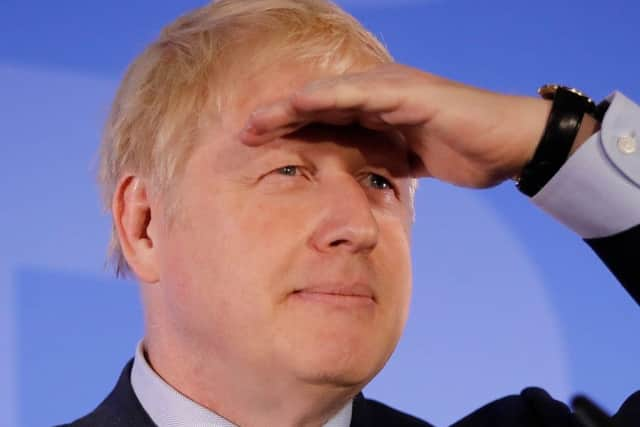Bill Jamieson: Storm on horizon as economic concerns fall down agenda
Time was when the economy was once the centre-stage of our political concerns. But where’s it gone? It’s vanished from view. Amnesia has set in, a hapless, directionless drift. For all the noise of the Conservative leadership campaign, the promises of tax cuts and spending boosts, we seem caught forever in a doom loop: progression abandoned, momentum lost.
Calm before a thunderstorm? I fear so. Looking at the clouds building, domestic and eternally, I sense the building of a thunderstorm this autumn as pressures long building below the surface of Brexit seek release.
Advertisement
Hide AdAdvertisement
Hide AdSurveys of rock bottom business morale now barely rate coverage, so repetitive have been the cries of despair over a Brexit impasse that has not only already been extended seven months to 31 October but could also now be further delayed into next year.


Latest figures on record numbers in work, historically low levels of unemployment and a gradual rise in average real earnings have worked to give an illusion of economic health. But they are more likely to be the product of the massive slump in business investment and expansion as firms resort to temporary labour hiring instead of spending on new plant and equipment.
In Scotland the Scottish Fiscal Commission warned last month that growth here will not rise even above one per cent until 2021. It sees the economy expanding by just 0.8 per cent this year, down 0.4 per cent on original estimates, rising to only 0.9 per cent next year – another downward revision. Pathetic. For this lacklustre performance, Brexit uncertainty is a notable contributor. It forecasts slower growth in Scottish international trade from the end of the transition period. And on business investment it expects ongoing Brexit uncertainty to lead to falling business investment in 2019 and 2020.
The UK overall entered the second quarter of the year on the back foot. Eleven of the 13 manufacturing sub-sectors saw output fall in April. GDP growth contracted 0.4 per cent during the month, the main drag being a plunge of 3.9 per cent in manufacturing output, the sharpest drop since June 2002 as car production fell 24 per cent. Services output was flat month-on-month and annul GDP growth slowed to 1.3 per cent in April from 1.9 per cent in March and 2.1 per cent in February.
The purchasing managers reported contraction in manufacturing (at a 34-month low) and construction (at a 14-month low) while services expansion was still only modest. Additionally, BRC and CBI surveys point to significantly weakened retail sales in May.
As for morale, the Federation of Small Businesses (FSB) reported this week that its Small Business Index was in negative territory for a fourth straight quarter: a first in its near 10-year history. Optimism has tumbled among small construction, manufacturing and retail firms and seven in ten small firms do not expect their performance to improve over the coming three months. Such is the murderous cost of Brexit uncertainty and delay. It is sucking the life out of business ambition. But somehow politicians continue to behave as if all this is a costless exercise, that an 11-cornered leadership contest can drag on for weeks, that “new” Brexit negotiations can be opened with the EU and that, in the minds of some, Brexit could be even longer delayed.
But all the while, the economic skies are darkening. Indicators of future growth are faltering amid signs of an international downturn. Following growth downgrades by the IMF, the European Commission and the OECD, the World Bank has now joined in with cuts to its global growth forecasts. Within advanced countries, the downgrade to the Eurozone’s growth in 2019 was notable - to 1.2 per cent, down from 1.6 per cent).
America’s business leaders, fearing trade protectionism, are growing more worried that the US will enter a recession by the end of 2020. In Europe, the European Commission slashed its 2019 forecasts for growth in Germany, long the powerhouse of the EU, to just 0.5 per cent, the second cut this year.
Advertisement
Hide AdAdvertisement
Hide AdBut are the Tory contenders worried? There’s no sign. Set against an overall debt total still above 80 per cent of GDP – a deadly level ahead of a downturn - the tax ‘n’ spend pledges of the Conservative leadership contenders have come to look ever more fantastical. The most prominent is that of Boris Johnson, whose pledge to raise the 40 per cent tax threshold from £50,000 to £80,000 with top earners paying 12 per cent national insurance, is reckoned by the IFS to cost £9.6bn.
That’s a snip compared to Dominic Raab’s proposal to cut the basic income tax rate by 5p and raise the national insurance threshold to £12,500. Cost, according to the Resolution Foundation, £32 bn.
Jeremy Hunt says he would cut corporation tax to 12.5 per cent (cost: £13 bn) and double defence spending (cost: £40 billion). Michael Gove says he would scrap VAT (cost, according to rival Rory Stewart: £20bn).
This contest only started on Monday. It has weeks to run. That these are candidates purporting to be Conservatives, a party that once stood for sound finance, is astonishing. Even before we get to the lofty claims of re-negotiating a Brexit deal with the EU, or leaving without a deal, is there anyone who believes a word of these? Anyone at all? Is there anyone with a credible plan to lift us free of drift? Anyone at all?